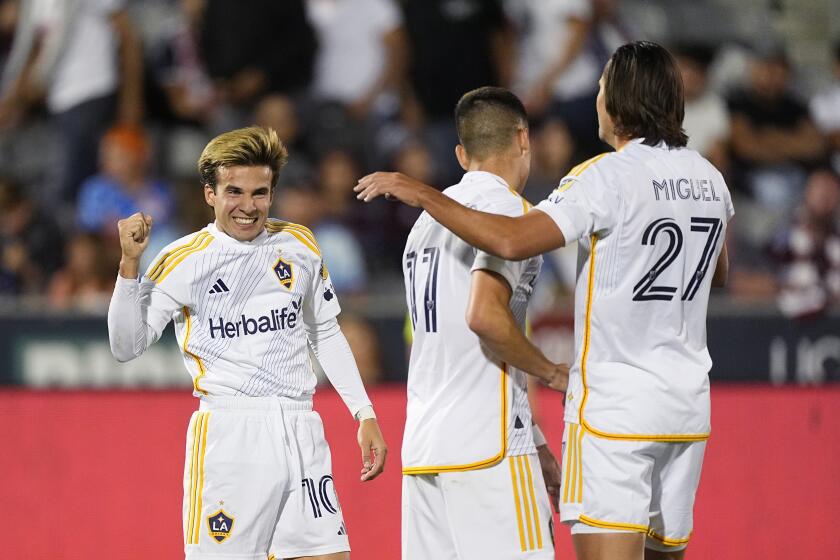A shot of Brandi is good for the spirit
Ten years ago, in front of the bulging eyes of a nation, a female athlete tore off her shirt, baring her black sports bra and her powerful soul.
Today, the shirt is in a drawer, the bra is in a frame, but the essence of that soul still soars through a woman’s sports landscape that was changed forever.
“It was about so much more than soccer,” Brandi Chastain says.
You remember, right? Will anybody who witnessed the culture-changing events of that sweltering summer day ever forget?
On July 10, 1999, at the Rose Bowl, Chastain made a penalty kick that gave the U.S. women’s soccer team a World Cup finals victory over China in front of more than 90,000 spectators and a television audience of 40 million.
It culminated weeks of sold-out games that marked the largest celebration of female team sports in American history.
The women, led by Mia Hamm and Julie Foudy and Chastain, were lauded as national heroes on the front page of this newspaper, on the cover of magazines, and in countless video clips that still buzz today.
Extolling the same virtues this country once admired only in male athletes -- unselfishness, toughness, smarts -- the champions were hailed as the pioneers of a new era in the long-ignored world of women’s team sports.
It was the month, the game, the moment that was supposed to change everything.
Ten years later, has it?
Some will say no, pointing to a lack of interest in women’s team professional sports and college sports. Some will claim the World Cup was an anomaly that generated a spirit that has long since disappeared.
Funny, but I see that spirit alive every day.
I see it in the many women doctors, lawyers, executives, teachers, successful professionals who were empowered by the ethic displayed by that team.
I see it in the many young boys who attend women’s sports events, males growing up with the kind of respect for females that years of legislation couldn’t enforce.
More than anything, I see it in my two daughters.
My oldest, Tessa, is a 20-year-old who was a shy little girl when she attended the World Cup finals. Buoyed by the experience, she eventually became a high school soccer player who became empowered with the sort of everyday courage that knows no gender.
Midway through high school, her skills stopped progressing, and she found herself the only junior on the junior varsity team. Every day for several months, her classmates and friends and former teammates would walk past her to their varsity games while she sat alone on the junior varsity bench.
It was humiliating. She wanted to quit. But she didn’t. Her role models on the 1999 World Cup team were tough girls, and tough girls stick it out.
Watching all this was her little sister, my younger daughter Mary Clare, who now, at age 14, plays basketball in the same manner. She shows up early, stays late, doesn’t keep score, won’t quit, understands it’s an honor just to be part of the group.
Today, the popular group at school is no longer reserved for the girls who cheer the sports, but also the girls who play them.
Like Chastain says, that was more than a soccer game.
“It was about teaching girls skills that were so long reserved for young boys,” she says in a phone interview from her Bay Area home, where she still plays soccer while also being a mom and an active proponent of female sports issues. “I really think the experience made girls stronger, more confident. They realized that team sports could be part of who they are.”
Foudy agrees, noting that the experience gave today’s kids something that those soccer players never had.
“We had no role models for team sports, nobody to look up to,” she says from Orange County, where she is a TV commentator and a mother of two. “It feels good to think that young women could grow up empowered by us.”
Not just athletes, but women everywhere, as noted by Katie Buckland, director of the California Women’s Law Center.
She was in an airport terminal when Chastain made her shot. She noticed that many young girls gathered around televisions refused their parents’ urgings to head to their gate.
“It showed young girls that team sports was every bit as glamorous, empowering and fun for them as it was for the boys,” Buckland says today. “It made them stronger and more resilient in all walks of life.”
So, what, then, explains the fact that one female professional soccer league in this country has failed, and the current one -- Women’s Professional Soccer -- has only seven teams and a handful of fans? What explains the decline of the WNBA, and the consistently empty seats that accompany the first rounds of the women’s NCAA basketball tournament?
It’s simple. Most of the nation doesn’t like watching women’s team sports. No need to apologize. No need to explain.
But just because we don’t want to pay to watch them doesn’t mean that they’re not priceless, because they are.
“It doesn’t matter whether there’s a league or not,” Buckland said. “It’s about young girls realizing that they have as much right to sports as boys.”
There should be some sort of national anniversary celebration for the 1999 women’s World Cup team today, but there’s not.
“Just a bunch of e-mails between the women on team, remembering this day, that sort of thing,” Chastain said.
There should be some building to house memorabilia to honor them, but, well, Chastain donated the sports bra to a museum that went bankrupt, and she just received it back last week.
“It used to be in the bottom of my sports bra drawer,” she says. “Now it’s in a frame.”
This should be a bigger deal. But maybe that’s the point. Maybe the best tribute to the team is that its effect has become so much a part of our lives, we no longer even notice it.
Which reminds me, I’ve got to finish this column and run to my third basketball game this week, which doesn’t count two practices and one referee training session.
Ah, girls.
--
twitter.com/BillPlaschke







